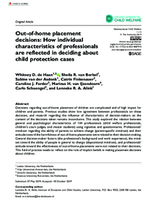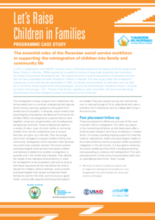Displaying 51 - 60 of 281
Drawing on interviews and focus groups with child protection social workers from three site offices in Aotearoa New Zealand (interviews, n = 26; focus groups, n = 25) and using thematic analysis, this study identified the case, internal organisational, inter-site organisational and external elements that contributed to threshold decisions.
This article departs from the view that when children are perceived as bearers of rights, this should also be reflected in the institutional documents of decision‐making. That is why the documented layer of decisions about taking a child into care is examined here.
In this study, the authors analyse a child protection services dataset that includes a network of approximately 5 million social relationships collected by social workers between 1996 and 2016 in New Zealand to test the potential of information about family networks to improve accuracy of models used to predict the risk of child maltreatment.
The current study examines the relation between several individual characteristics of professionals in the Netherlands and their decisions about out-of-home placement in a multivariate model.
This study investigated whether information regarding parents' response to an attachment-based intervention impacted placement decisions and agreement among decision makers.
Comprised of 12 videos and accompanying discussion guides, this video series features the learning from practitioners working across a range of care-related programs and practices in Cambodia.
The aim of this guide is to encourage a structured approach to developing Standard Operating Procedures for Child Protection Case Management in humanitarian settings.
These Case Management Minimum Indicators provide measurable benchmarks to assess the quality of case management in humanitarian crises.
This case study profiles the reintegration experiences of one child who has participated in the Tubarerere Mu Muryango (Let’s Raise Children in Families - TMM) programme in Rwanda.
This article reports on a qualitative study, which sought to retrospectively understand the contribution family group conferencing (FGC) makes to longer‐term outcomes for children at risk of entering State care and their families.


